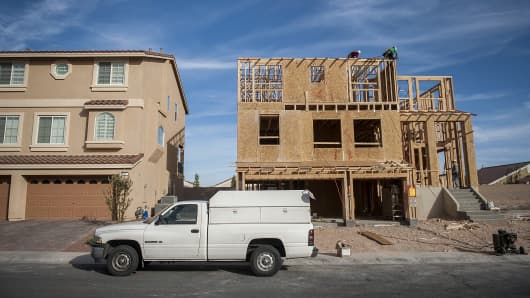Chris and Candace Rodgers wanted to move to a bigger house in a better neighborhood. With the Las Vegas housing market recovering—prices still down over 50 percent from the recent peak—they figured it was the perfect time. Unfortunately, there was nothing to buy.
"We looked at a lot of the existing homes, and some of them were bank owned and were in pretty bad shape," said Chris. "By the time you replaced old stuff, put in new carpet and paint, you're up to this price, so they might have been bargains for the base price but not after."
Instead, the Rodgers turned to new construction. They bought exactly what they wanted from Pardee Homes, a Los Angeles-based builder with a large footprint in Las Vegas.
Since Chris is a veteran, they were able to get a 4 percent interest rate on a government-backed loans. Instead of selling their old home at a loss, they found a renter. "With the rental income, that reduces it by about 40 percent, and after taxes, if you look at the savings from interest...we're paying about $600 a month to live here, so that makes it reasonable."
The Rodgers are precisely why supplies of homes in Las Vegas are down 57 percent from a year ago and why housing starts are up 96 percent, according to Applied Analysis, a Las Vegas research firm.
"Certainly it's a strong comeback from where we were a year ago," explained Klif Andrews, Nevada president of Pardee Homes. "The overall economy has gotten better, the buyers understand now that these low interest rates are a real dramatic opportunity for them, and most of all the resale inventory has dried up."
(Read More: Taking The Real Estate Recovery Local)
There are roughly 4,500 homes listed for sale in Las Vegas today, about half the usual supply. There are over 6,000 single family homes for rent, about five times the normal supply.
"At minimum there are at least ten thousand individual primary homeowners that are put on the sidelines because the hedge funds are coming in and absorbing the assets," said Noah Herrera, vice president of the Greater Las Vegas Association of Realtors.
Investors swarmed into the Las Vegas market, much like they did in Phoenix, AZ, using all-cash private equity funds to buy distressed properties in bulk. As competition grew and supplies shrunk, prices took off. While still well below the peak, the median home price is up 24 percent in Las Vegas from a year ago, according to Applied Analysis. Part of that is a shift in the mix of homes selling, as fewer distressed homes come to market. The new dynamic has kept regular move-up buyers on the sidelines and new listings historically low.
(Read More: Home Buyers Are Back, but Where Are the Houses?)
"What's holding people back from buying a property is a fear of selling their property and not being able to find one. That's what the problem is," noted Herrera.
The Las Vegas market is being fueled by investors, but even the investors can't find the great bargains anymore. While the economy has improved some, the drop in foreclosures is really due to a new law that went into effect in Nevada last year; it criminalizes faulty foreclosures. Banks have therefore tried to do more short sales and loan modifications. Foreclosures in Nevada dropped 36 percent in 2012 from the previous year, according to RealtyTrac, but the distress is still there.
"People in Las Vegas talk about shadow inventory to the point where nobody really wants to talk about it anymore, said Mike Brunson, a local appraiser. "People will argue and say it isn't, but I can name a dozen people off the top of my head who have been in their houses for over three years without a payment."
Brunson called Las Vegas the Titanic of the real estate market. It was once thought unsinkable, and even now that the worst is over, he still thinks the market is on a well-provisioned life raft, not on solid ground.
"The only thing that concerns me is that we have been here before and the market itself is not what is driving the price increases. It's not that we have new employers coming in and creating tens of thousands of new jobs that are leading to people buying new houses. It's 'Las Vegas is on sale,' and investors are buying up everything they can in the used market.
Whatever the cause, the result is new construction and new life breathed into the nation's home builders.
"There's been a lot of talk about shadow inventory. It's gone on for years, and the reality is there's not enough inventory out there to meet demand today. Demand has increased, certainly our buyers see that, and we're getting a lot of buyers because of that," argued Andrews, whose company is, he said, building 150 percent more homes than a year ago.
(Read More: Home Buyers Are Back, but Where Are the Houses?)
Brunson acknowledged there is no question the demand is real. The sales are real. But he still worries about the fundamentals, such as the slow economic growth and the fact that so much of the funding for new home sales is coming from low down payment, government-backed mortgages.
"We have been here before," said Brunson.
What remains to be seen is if history will repeat itself or if this recovery is as unique as the collapse that preceded it.
—By CNBC's Diana Olick; Follow her on Twitter @Diana_Olick or on Facebook at facebook.com/DianaOlickCNBC
Questions? Comments? RealtyCheck@cnbc.com



